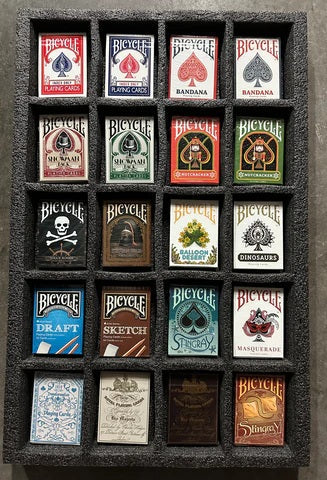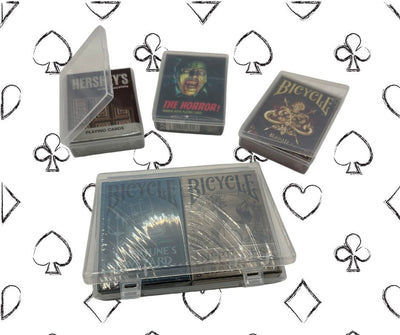Solitaire card games are ideal for playing casually on your own, because they are typically quite easy to learn and play. This is especially the case if you're using digital software to help you learn and play the game. Using an app or computer program like BVS Solitaire to play solitaire enforces the rules, and will manage a lot of the bookkeeping and organizing of the cards for you, avoiding the need for any shuffling and dealing. As a result, solitaire games are very accessible, and can be played and enjoyed by almost anyone.
But what about solitaire games that are so simple to play that they can even be enjoyed by children? And which solitaire games exactly would be good choices to introduce to younger kids? Fortunately the range of solitaire card games is so diverse that there are many excellent and simple solitaire games that are perfectly suited to people of all ages that want something very easy or casual to play.
Builder card games like the most well-known solitaire game of them all, Klondike, aren't normally best suited for this purpose. These typically require players to manipulate a tableau and arrange each of the four suits in order from Ace through King. While they have luck elements, they sometimes also give room for real skill and strategy. In contrast, non-builder card games tend to have more straight-forward aims and simpler game-play, making them especially well-suited for beginning players, or for those looking for a lighter game-play experience.
What you'll find here are perhaps the simplest solitaire games of them all, which makes many of them perfect to introduce to younger children. And because of their simpler mechanics, most of these are also well-suited to being played with an actual deck of playing cards.
== Your Very First Solitaire Game ==
We'll begin with what is arguably the simplest solitaire game of them all, and a true classic: Clock Solitaire. Precisely because it is a purely mechanical process, Clock Patience is an ideal game for introducing children to a deck of playing cards, get them familiar with the different values and suits, and have fun at the same time.Clock Patience
Overview: Clock Patience is found in nearly all books with solitaire games, and exactly the same game can be played with a non-clock layout under the name Travellers. The cards are dealt in the shape of a clock, with a pile of four face-down cards at each hour's position plus four cards in the center. Starting with a center card, you turn up a card and move it face-up to the hour matching its value, with Kings played to the center. Then you turn up that card and do the same, continuing this process. The game ends when you turn up the fourth King, and you win if you've managed to turn up all the cards at this point.Thoughts: This simple game is an exercise in pure luck, and is an entirely mechanical process with no decisions. Yet younger children will often delight in the simple matching exercise this involves, and play this over and over in an effort to get the satisfaction of achieving a win. The odds of winning Clock Patience are exactly 1 in 13, but several variants and related games increase the odds, or add decisions to the game-play (e.g. Watch Solitaire, Order Time, Dial, Big Ben). German Clock (commonly called The Clock) is an entirely different game with a Clock setup that is also worth trying for beginners. Grandfather's Clock is a builder game that requires far more skill and decisions.
== Simple Adding & Pairing Games ==
Adding and pairing games are naturally well-suited as simple games, because they rely on the very simple mechanic of requiring you to either match cards of the same value, or match cards that add up to a certain value. I have already covered some of the best of this genre in another article entitled Popular adding and pairing solitaire games.However that article only covers games of this type that are more rewarding and satisfying, and require a slightly higher level of decision making. I deliberately omitted simpler and more luck-based adding and pairing games suitable for children, saving them for the section below. Note that aside from the game Thirteens, the games immediately below are all pairing rather than adding games, so even the ability to perform basic addition isn't required in order to play any of them.
Aces Up
Overview: Aces Up (less commonly called Aces High, and other names like Firing Squad) is a classic and very easy solitaire game found in most books and collections. The tableau consists of four face-up piles, with an initial deal of just one card on each. If two cards have a matching suit, you can discard the lower valued card, and this is the main mechanism of the game you'll be repeating over and over. When you're stuck, you deal four more cards from the deck and continue this process. Empty spaces in the tableau are filled by a top card from any pile. You score points for every discarded card, with the goal of discarding everything except leaving just the four aces up, hence the name.Thoughts: This game is one of three different games that sometimes also go under the name Idiot's Delight (the other two being the somewhat similar Perpetual Motion and King Albert), due to the low chances of winning. It is extremely easy and relaxing to play, since the main mechanism is simply to discard a card whenever you have two cards with a matching suit. While there's not a lot of decisions, there's enough to keep it interesting, and it's suspenseful to see whether the luck of the draw will help you discard everything except the Aces. It doesn't happen that often, but sometimes you can discard a large number of cards in succession.
Memory (Concentration)
Overview: Memory will be familiar to most people as a multi-player game, but it can also be played solitaire with a regular deck of cards. All the cards are laid out face-down in a number of rows. Two cards are turned face-up at a time, and can be removed if they are a matching pair, otherwise they are replaced face-down. The goal is to remove all the cards in pairs of the same rank. The game can be simplified even further for younger children by using just 12 pairs of cards, for a total of 24 cards instead of a full deck of 52.Thoughts: This game is most familiar as a competitive game under the name Memory. But it can be turned into a solitaire game by adding a scoring system, e.g. you lose a point for each unsuccessful match, and gain five points for every successful match. Alternatively you can simply try to clear the tableau in as few turns as possible. According to probability gurus, perfect memorization and optimal strategy requires an expected value of 41.4 moves.
Perpetual Motion
Overview: Perpetual Motion has somewhat of a similar feel to Aces Up, with four cards being dealt at a time. Unlike Aces Up, you're looking for cards with matching ranks rather than matching suits. When two exposed cards have the same rank/value, they are placed on top of each other. When you manage to get all four cards of the same rank on top of each other, they are discarded. The goal is to discard the entire deck in this way, redealing as often as necessary.Thoughts: Perpetual Motion has obtained its alternative name Idiot's Delight due to the fact that it's only achievable slightly over half of the time, and in the case of successful games it takes an average of 128 rounds to complete. Some variant ways of playing do make the game more fun, such as the variant where cards of matching rank aren't moved to the left column, but can be moved to whichever column contains one of the cards. This allows for more decision making and greatly improves the game and your winning chances.
Simple Pairs
Overview: As the name suggests, Simple Pairs is indeed a simple game. You deal nine cards in a 3x3 grid, and remove any matching pairs, immediately filling spaces thus created from the stock.Thoughts: This is a much simpler pairing game that is entirely luck-based, to which games like Nestor and Vertical add further complexity and decision making. The variation Criss Cross has just five tableau piles, making it even harder to complete successfully, and is also a game of luck.
The Wish
Overview: One of the simplest games there is, with The Wish you remove all the 2s through 6s from a deck, and shuffle the remainder of the deck into eight piles of four cards each, with the top card of each pile always face-up. Matching pairs are removed, and the idea is to successfully get rid of all the cards.Thoughts: There are very few decisions along the way, but despite this almost coming down to luck, it's still satisfying to complete successfully, and suspenseful to see if the cards will turn out. The speedy game time really helps too. In some variations (e.g. Genie) all the cards are face-up and visible, which adds some element of skill and planning. The Wish is effectively a simplified version of the Nestor variant Doublets, a pairing game.
Thirteens (Simple Addition)
Overview: The game Thirteens (also called Good Thirteen, or Simple Addition) has a layout of ten cards. Cards need to add up to 13 to be removed, with the Jacks counting as 11, Queens as 12, and Kings as 13.Thoughts: This is a simple adding game in the style of Fifteens, which employs a 4x4 grid, and allows you to remove pairs of cards that add up exactly to 15. Fifteens presents a larger challenge, however, because court cards and 10s need four-of-a-kind to be removed. A lot of luck can be required to win Thirteens. A closely related adding game that increases your winning chances is Tens, which has 13 tableau piles and allows you to replenish cards immediately after they are removed.
Tri-Peaks
Overview: Strictly speaking Tri-Peaks isn't a matching game, since in this game you are removing cards one higher or less in value than the current card. The layout has an arrangement of three adjacent pyramids (hence the name) of six cards each, and a lower row of ten cards. After dealing a card face-up from the remaining stock to the waste pile, you remove to the waste pile any cards in the tableau that aren't covered by other cards, each time going up or down in value by one. The aim is to remove all the cards in the layout while going once through the deck.Thoughts: Tri-Peaks is a descendant of Golf, which applies similar game-play to a tableau of seven columns with five cards each. In Golf you can plan your moves since so many cards are face-up, but not being able to `wrap' from Aces to Kings or vice-versa makes it quite difficult. Like Tri-Peaks, Putt Putt removes this restriction, which makes the game much easier than standard Golf (although this is also how many software programs implement Golf). Tri-Peaks simplifies things along similar lines, and shot to popularity after being included in Microsoft Windows' standard solitaire suite. Robert Hogue created it in 1989, and his analysis suggests that most Tri-Peaks games are solvable.
== Other Simple Solitaire Games ==
As far as simpler solitaire games go, adding and pairing games represent the most common and well-known type, given the simplicity of the mechanism involved. But there are a few lesser known solitaire games that don't rely on adding or pairing, and yet are extremely simple to play, such as the examples below.Hit or Miss
Overview: Hit or Miss is an entirely mechanical game where you simply deal out a deck one card at a time, counting cards as you go using the values of a suit: "Ace, Two, Three, etc." You carry on all the way to "Jack, Queen, King," at which point you start over with "Ace..., etc." Each time the card you deal matches the value of your count, that card is considered "hit" and is removed from the deck. After going through the entire deck, you repeat the entire procedure. The game stops if you deal through all the cards twice without getting a single hit, and the aim is to eliminate all the cards from the deck.Thoughts: I first came across this game in The Little Book of Solitaire (Running Press, 2002), and was pleasantly surprised at the level of fun it produced, despite its simplicity. It's a pure exercise in luck, yet it incorporates an element of suspense that makes it surprisingly enjoyable. If you can count from Ace through King, and can recognize the numbers/values, then you can play this game, so it's very easy to do. Very closely related is the solitaire game Frustration, which uses the same dealing and counting process, but has the opposite aim: you win only if you deal through the entire deck without getting a single hit.
Higher/Lower
Overview: In the simple game of Higher/Lower, which is less well-known than the other games above, you only use a single suit of playing cards, i.e. 13 cards in total. After the first card is dealt face-up, your aim is to correctly guess whether the next card is higher or lower in rank than the previous card. You win if you successfully manage to guess all the 12 cards after the initial one.Thoughts: I first stumbled on this game on the Solitaire Suite app from RikkiGames. It is more fun than it seems, because you do have probability on your side. Even so, it took me over 100 games to score three wins. But with a digital version it's quick and easy to play, with each game typically lasting less than half a minute. The further you get through the 13 cards, the more information you have to work with, because you know what cards have been played, and this means you aren't just guessing randomly, but have informed knowledge, and can quickly calculate the probability of whether the next card is higher or lower. Much more fun that it first appears!
Others
I have come across some other simple games that are far less known that are also fun. For example, I quite enjoyed the game 52 Pickup which I came across in the All-In-One Solitaire app from Pozirk Games. All the cards are dropped into a face-up mess, and then you have to grab them all as quickly as you can - but there is a catch: the next card you can pick up must be equal to or one value higher/lower than the last card you picked up. This gives it the feel of a game of Golf with added real-time tension.The same app introduced me to 60/90 Seconds, which is also a Golf-style of solitaire, where you race against the clock to collect cards one value higher or lower than the dealt center card, earning as many points as you can in either 60 seconds or in 90 seconds.
Conclusion
This is by no means an exhaustive list, but it does represent some of the best and well-known simple adding and pairing games, and a few other simple non-builder solitaire card games. Undoubtedly there are others that could be added. But this should give you a great entry point for keeping your children amused with a simple solitaire game with a standard deck of playing cards, or even for yourself.I especially recommend playing with a lovely custom deck of cards, because even a simple solitaire card game serves as a great way to appreciate and enjoy the artwork and design of a quality custom deck. Or alternatively, play digitally with the help of some excellent software like BVS Solitaire, which allows you to choose from different solitaires by type, including many simpler adding and pairing games.
About the writer: EndersGame is a well-known and respected reviewer of board games and playing cards. He loves card games, card magic, cardistry, and card collecting, and has reviewed several hundred boardgames and hundreds of different decks of playing cards. You can see a complete list of his game reviews here, and his playing card reviews here. He is considered an authority on playing cards and has written extensively about their design, history, and function, and has many contacts within the playing card and board game industries. You can view his previous articles about playing cards here. In his spare time he also volunteers with local youth to teach them the art of cardistry and card magic.





